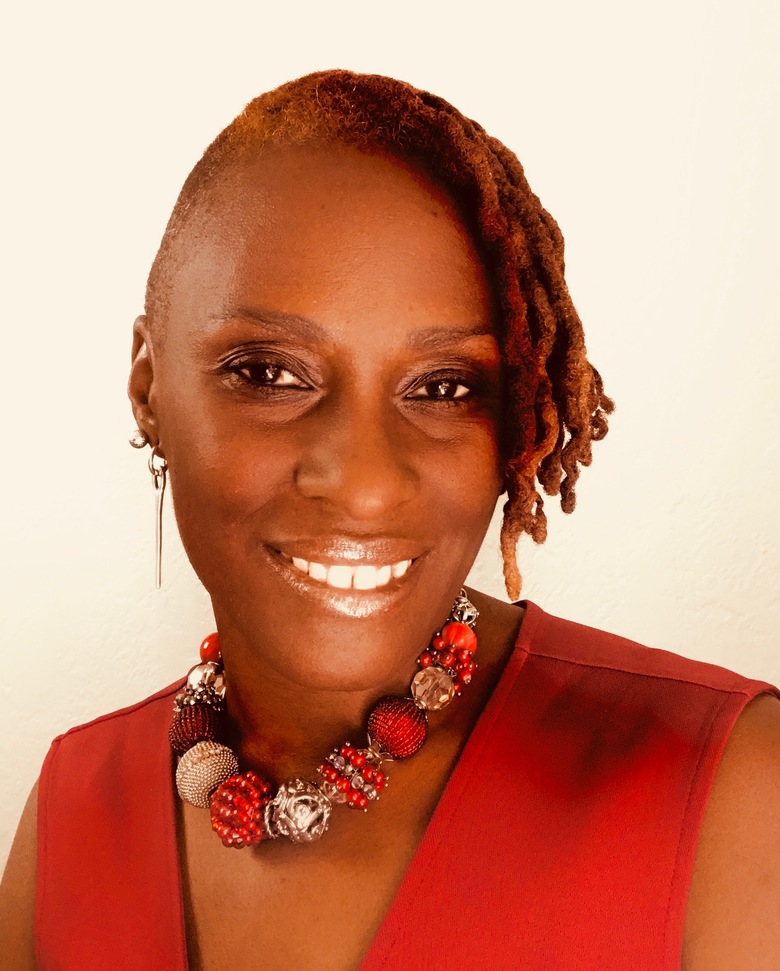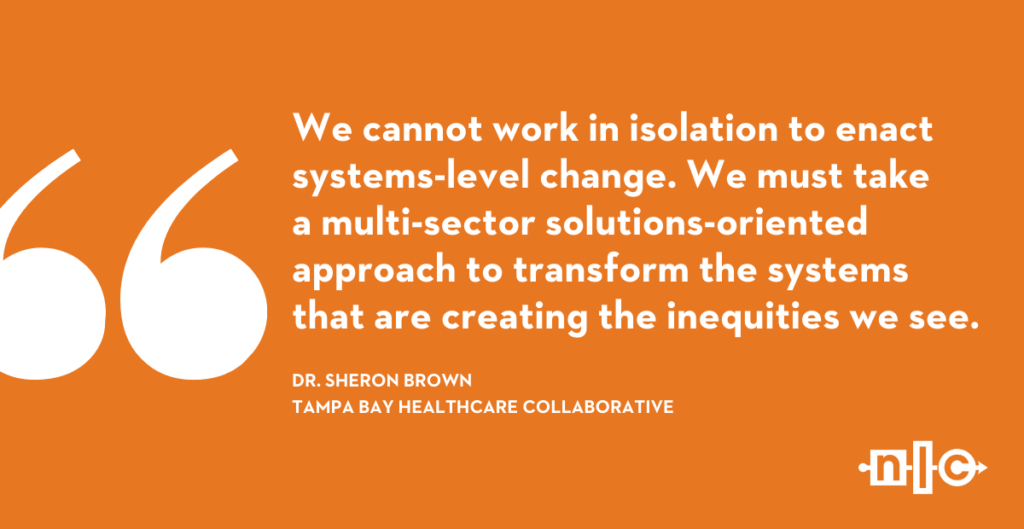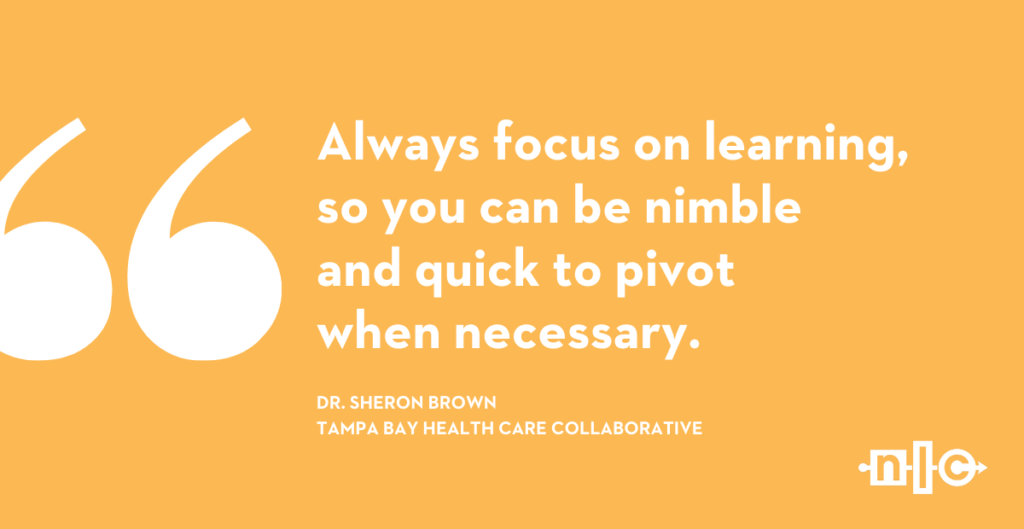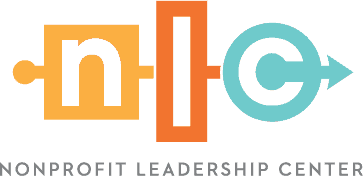At the Nonprofit Leadership Center, we believe the best lessons in nonprofit leadership come from nonprofit leaders themselves. Our 10 Questions With Series celebrates and elevates nonprofit and business leaders across the Tampa Bay region who are making an enduring impact on our communities. Today, we’re pleased to introduce you to Dr. Sheron Brown, executive director of Tampa Bay Healthcare Collaborative (TBHC).

Dr. Brown is a passionate community advocate who has dedicated her career to bringing individuals and organizations together to work collaboratively to achieve health equity. Prior to joining the Tampa Bay Healthcare Collaborative, Dr. Brown served as a wellness educator, consultant and coach to schools, school leaders and women of color who struggled with chronic disease. She also served as the national director of program quality for Teach Plus, a national program to empower excellent, experienced and diverse teachers to lead key policy and practice issues that advance equity, opportunity and student success. Dr. Brown holds her Ph.D. in professional studies in education from Capella University in Minneapolis, a master’s degree in education from the University of New Haven, and a bachelor’s degree in accounting from Howard University.
Here’s what Dr. Brown had to share about the power of collaboration, what it takes to advance systemic change, leading a nonprofit through COVID-19, and the inspiring story behind her name.
Q1: As the executive director of the Tampa Bay Healthcare Collaborative, tell us a little bit about your organization and what drew you to serve this nonprofit.
Dr. Brown: The Tampa Bay Healthcare Collaborative is a member-led nonprofit dedicated to promoting and advancing health equity for people of color and those in low-income communities. The organization was started in 2003 by leaders who wanted to work together to help ensure that our most vulnerable populations had access to quality health care. Even though they were focused on different areas — from homelessness and food insecurity to dental care or community heath — they believed they could help solve collective problems together. Today, the Tampa Bay Healthcare Collaborative is still about that: Bringing people who represent different organizations and areas of expertise together to solve the problem of inequities in health.
When I discovered the executive director role at TBHC, I knew immediately this was the seat where I was meant to be. I was interested in serving in a role where I brought my entire self to the opportunity. I wanted to bring people together and help them work through the process of solving some of our most intractable health problems. We cannot work in isolation to enact systems-level change. We must take a multi-sector solutions-oriented approach to transform the systems that are creating the inequities we see.

Q2: Not only are you newer to your current executive director role and leading a nonprofit, but you’re doing so through COVID-19 and an unprecedented time in our history. What are the most important lessons you’ve learned about leading a nonprofit during this time of crisis?
Dr. Brown: The most important lesson is something we should already know — to always be focused on learning so you can be nimble and quick to pivot when necessary to offer value to those we serve.
READ NEXT: Pivoting Together: The Eye-Opening Impact of COVID-19 on Nonprofits
Because I’m new to my role as TBHC’s executive director, I was already in a learning phase — studying the organization and the community and listening to what members wanted. I was already thinking about what the future of TBHC should look like when COVID-19 came along, which proved to be important for figuring out how to bring people together who want to solve problems while everyone is locked in their homes.

Q3: Is there anything positive that COVID-19 has brought to your leadership or organization? What, if anything, will you and your organization do differently as a result of COVID-19?
Dr. Brown: As horrible as COVID-19 has been for individuals, families and communities, it has affirmed the work we’re doing and the importance of focusing on health equity. When you look at the rates of African Americans who are dying as a result of COVID-19, they are higher than the white population. There are inequities in health care and there are systemic issues that we need to dig down into the roots of to create solutions. I don’t know if I feel comfortable calling that positive, but COVID-19 has affirmed the need for this work.
In terms of what we will change, I was already thinking about ways to incorporate technology to enhance our members’ value. When COVID-19 hit, everyone recognized the need to incorporate more technology into the services they offer to constituents.
Q4: Fostering community relationships is a significant part of your role. Many nonprofits tell us they struggle with moving their relationships beyond transactional engagements. What strategies do you feel are most critical to forge authentic partnerships that spark change?
Dr. Brown: I love this question because it gets at the heart of what I’m focused on: getting people to collaborate effectively.
When different people come together who represent different seats in the health space, they’re doing so to solve a common problem. The very first thing they must do to be effective is to agree on a collective goal. For example, if I’m coming from a health center and you’re coming from your own private practice, we clearly have different agendas. Our agendas color our lenses of what we think we want to do. We must first be willing to sit in the same room, knowing that we represent different agendas, yet agree to work on a collective goal that would address the needs of our clients or constituents despite our agendas. That takes time. That’s one thing that the Tampa Bay Healthcare Collaborative is here to do — to help those who sit in different seats and different organizations in healthcare arrive at a collective goal.
Secondly, effective partners must determine if they have the right people at the table. People’s egos often get in the way. We must decide what roles we will play and what responsibilities we will have. Sometimes, people want to hold a bigger role because they want their organization to be viewed as owning the initiative. That’s where collaboration can start to fall apart. But if we can come together on an aligned goal with the right people at the table, that’s where change happens. As individual partners, we must stay focused on the wicked problems we need to solve. By thinking about our skill sets and resources in a fair manner and removing ourselves from it, we can collectively have an impact together.
Of course, there are other important factors like deciding on a clear decision-making process — who’s facilitating us through our problem-solving? What is our roadmap to getting to where we’re going? How will we agree to hold each other accountable?
Q5: How will the need to do more business virtually affect community partnerships?
Dr. Brown: That is a good question because we must figure out how to be effective in meetings. A lot of the “doing” happens outside of meetings. I have been part of many in-person meetings that aren’t impactful, and it’s really easy to take our habits and bring them into a virtual space. Just as we had facilitators for in-person meetings, I believe the same has to happen virtually. Facilitators are still necessary. We also need a structure for what happens before, during and after meetings so that partners aren’t meeting just to meet; they need to go out and have impact.
Q6: You are a longtime community health advocate and have owned a company to help people achieve total wellness. For nonprofit leaders whose anxiety and workloads are higher than ever, what guidance would you share to ensure self-care is a priority?
Dr. Brown: First, you are not your job. You are not your role. Your identity is not the same as what you do. Oftentimes, we can confuse our identity with what we do and the role we have. That can cause people to work themselves into the ground. Identify your true identity, and that will help you work differently and be diligent about staying in touch with how you have come to serve humanity.
The second thing you can do to reduce your stress is meditation. You can’t get meditation wrong, even if you think you don’t know how to do it. There are so many YouTube videos, apps and classes, It allows you to slow down and clear all that junk in your head. You bring yourself into a calm, connected state. When you’re in that place, you can think more clearly. You make better decisions. You feel the presence of your purpose.
Q7: You’re currently participating in one of our Nonprofit Leadership Center CEO Circles. For nonprofit leaders who may not be familiar with this peer-based leadership group, tell us about your experience so far.
Dr. Brown: Through NLC’s CEO Circle program, leaders come together and share the problems they’re experiencing that they can’t share with their staff and won’t necessarily want to share with their boards. It’s an opportunity to sit in room (or via Zoom) with people who hold similar positions and may have had similar challenges and be able to receive guidance and support in a safe place.
Learning from the experiences of others in the group has been helpful to me, especially as it related to the Payroll Protection Program and how everyone was handling it with their boards, budgets and funders. It was a great learning experience, and I was able to take some of what they said and apply it to what I was doing. Recently, I had a challenge and turned to this group. Two members had a similar experience when they first started in their executive director roles and offered advice that I applied immediately. The pressure valve on that problem was released. I felt lighter.
We had a very profound conversation in our last meeting about everything that’s going on in the world today with protests and Black Lives Matter. It was a very vulnerable, honest conversation. I appreciated that moment very much.
Q8: What’s the best book on leadership or professional development you’ve read that you think every nonprofit leader should read?
“The Surrender Experiment” by Michael Singer. If I could get everybody in the world to read it, I would.
The author shares his journey through life of surrendering to fear and to whatever life put in front of him rather than resisting. He is incredibly successful today. The story of how he experienced life made me realize that if we surrender to the moment, be present, observe and listen with our ears and our hearts, we’ll be guided to the next thing. That has helped me with how I lead and how I live.
Q9: What are your favorite shows or movies you’ve watched during quarantine?
I love Self Made and She Did That on Netflix. I recently watched Just Mercy, which tells the story of the state of humanity as it has been since the founding of this country. I would recommend everybody watch that movie.
Q10: What is something interesting about you that most people don’t know?
Dr. Brown: Definitely the story behind my name and why it means so much to me.
My mother was born in Jamaica in the 1940s. Her grandmother wanted to name her Princess Mercedes. The hospital workers told her she couldn’t do that because she was not a princess. (Remember, Jamaica is connected to Great Britain, and so they were caught up on that.) So, my grandmother named my mother Mercedes Princess.
Fast forward to when I was born. I don’t know what my mother wanted to name me, but there was a name and my father disagreed. He picked my name: Sheron. They named me Sheron Mercedes.
Fast forward 30 years later. I’m at a professional development workshop. We’re standing in line for lunch and I start talking to the man in front of me. We exchanged names and when I told him my first name was Sheron, he said, “Do you know that the name Sheron means princess?” I had no clue. Essentially, my name is Princess Mercedes. Without my mother knowing it, I ended up getting the name that was intended for her. This is significant for me because I am my mother’s and grandmother’s legacy. My grandmother never went to school and my mother was only able to complete the sixth grade. I always knew I wanted to go as far as I could in education for their name’s sake. I always say my Ph.D. belongs to them.
Would you or someone you know be a great leader to profile for an upcoming 10 Questions With Series article? Email us at info@nlctb.org with your recommendations.
Sign up for our weekly e-newsletter to get more great advice from nonprofit leaders, along with the latest tips, tools and trainings for nonprofits.




